* You are viewing Posts Tagged ‘Digitization’
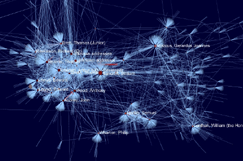
The CofK network at-a-glance.
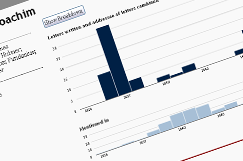
New interactive bar charts.
Further to our report on Scott Weingart‘s visit and presentation on Visualizing and Navigating the Republic of Letters, here’s a quick update on some of the fruits of his labours. During the week he was with us, Scott worked intensively with our developer community at BDLSS to implement some visual respresentations of the metadata assembled in our union catalogue of early modern correspondences, and the team produced some lovely deliverables within record time. The first are some revealing social network visualizations of the relationships between the 11,284 correspondents currently on the system, created with the Gephi graphics package. The second are some interactive, in-browser bar charts for display on person profile pages, displaying at-a-glance the number of letters sent, received, and mentioned in, created with the d3.js javascript library… and there’s more to come. At-a-glance representations such as these will radically improve the legibility and navigability of our records for end users, so a thank you to Scott for sharing his expertise with us. A public beta of the union catalogue will be available in the autumn.
Update: Preview some preliminary results
We are fortunate to have with us this week Scott Weingart, a former student of Robert A. Hatch and an up-and-coming visualization expert from Indiana University‘s Cyberinfrastructure for Network Science Center. Following on from a workshop at Mapping the Republic of Letters (Stanford) and a three-month stint at CKCC (Huygens Institute), Scott will be spending time with our union catalogue development team at BDLSS, raising awareness of the various techniques and technologies available for representing and visualizing large epistolary datasets. Scott kicked off his stay with a well-attended presentation on ‘Analyzing, Visualizing, and Navigating the Republic of Letters’ on Monday 11 July. In a two-part discussion, Scott provided a general introduction to the many uses and histories of visualizations, before describing in detail the various software packages and data formats necessary for implementation. Both of Scott’s talks can be watched again below; you can also ‘click along’ with his slides.
Part I: Introduction
Part II: Implementation
James Brown
July 13, 2011
Conferences and Workshops, Events, Project Updates
Tags: Databases, Digitization, Europe, Geography, Global, Networks, Spatial Theory, Visualization
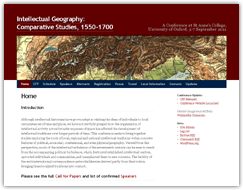
We are pleased to announce that booking is now open for Intellectual Geography: Comparative Studies, 1550-1700, the second Project conference, which will take place at St Anne’s College, Oxford, on 5-7 September 2010. Organised by Howard Hotson, the event brings together case studies and digital projects exploring the roots of local, regional, and national intellectual traditions and networks within concrete features of political, economic, confessional, and physical geography. For provisional programme information, a steadily growing lists of speaker profiles and abstracts, and to book online, please visit the conference website. The deadline for registrations is Wednesay 31 August.
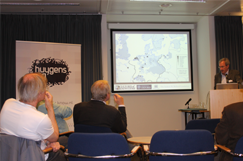
Project Director Howard Hotson opens our talk with some Hartlibian background.
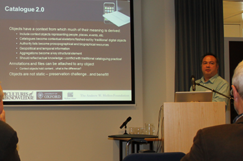
Our technical lead Neil Jefferies describes 'Catalogue 2.0'.
Last week provided us with another opportunity to share the Project, specifically its union catalogue and associated editorial tools, at the international conference Representing the Republic of Letters (The Hague, 30 June–1 July 2011). Organised by our partners and good friends CKCC in the congenial surroundings of the recently renamed Huygens ING, and held in conjunction with the Descartes Centre at Utrecht University, the event showcased the fascinating work being undertaken by various individuals and projects worldwide to represent early modern correspondence networks and their constituent components digitally and visually. General sessions devoted to funding and standards facilitated ongoing collaborative discussions between CofK, our hosts, and Mapping the Republic of Letters (Stanford), who also presented at the event.
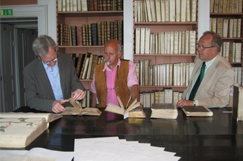
Exploring the epistolary treasures of Uppsala University Library.
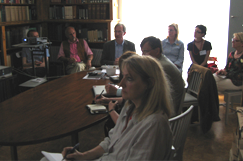
Demonstrating the catalogue at Uppsala University Library.
Last week provided us with an exciting opportunity to share the ongoing work of the Project, specifically relating to our union catalogue of early modern correspondence, at two of the most important research libraries in Sweden. In a whistle-stop tour of the Scandinavian state – one of the great powers of early modern Europe, with one of the most exciting epistolary collections in the world today – Project Director Howard Hotson visited Uppsala University Library (the Carolina Rediviva) and the National Library of Sweden in Stockholm, meeting their directors and other key library personnel; exploring their extensive holdings of early modern letters; and discussing our plans for the union catalogue with seminar audiences. The itinerary concluded in the Department of Literature and History at Stockholm University, where Howard presented his ongoing work on the intellectual geography of Ramism (a theme soon to be revisited in the context of our 2011 conference). We would like to thank everyone involved with the visit – especially Professor Erland Sellberg of the University of Stockholm, Dr Ulf Göransson and Håkan Hallberg of Uppsala University Library, and Dr Otfried Czaika of the National Library of Sweden – for their extremely generous Scandinavian hospitality, with a special ‘shout-out’ to Dr Per Landgren, a visiting scholar with the University of Oxford’s MEHRC, who conceived the idea, generously mobilised his scholarly connections on our behalf, and (as if this were not enough) also did most of the logistical legwork. Thanks, Per!
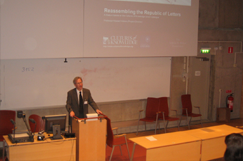
Introducing the catalogue at the National Library of Sweden, Stockholm.
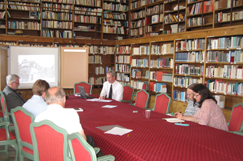
Discussing intellectual geography at the University of Stockholm.
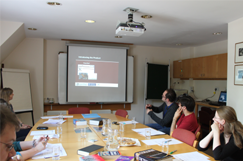
Introducing the product.
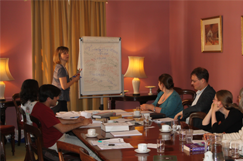
Creating the shortlist.
With the autumn launch of the Project’s union catalogue of early modern letters getting ever closer, and issues of design and functionality now sorted, we are turning our attention to broader questions of digital identity, digital presence, and branding. Heeding UCL digital humanities expert Melissa Terras’s insight that online resources ‘should be taking [their] digital identity and digital presence a lot more seriously’, and aware that ‘naming your brand is the most challenging, momentous, and necessary phase in the process of branding’, we hand-picked a crack team of scholars, librarians, editors, and linguists external to the Project to help us formulate an appropriate appellation for our new resource. Over an intensive ‘logo lunch’ at Linacre College, Dr Kim McLean-Fiander guided our set of sobriquet suggesters through a series of mind-bending puzzles and tasks designed to release creative juices, unlock associative thinking, and lead participants to that elusive ideal name. While the results of the exercise will remain under wraps for now, the input we received was invaluable, and we would like to thank all of the participants for giving us their time.













 Join
Join 